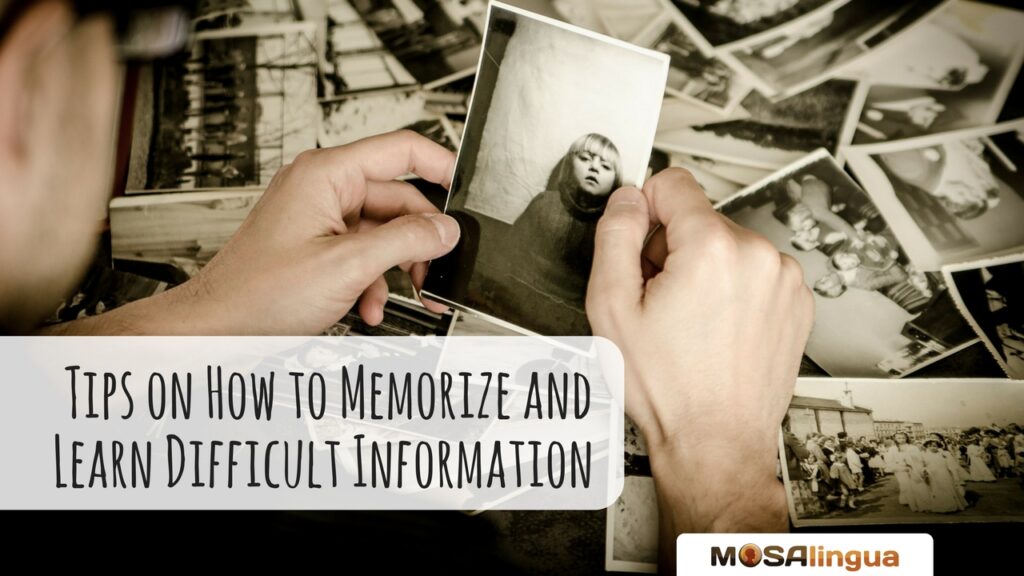Many people think they have a bad memory (myself included). Some people, for example, have trouble remembering dates or people’s names. However, if you’re wondering if there’s a way to memorize vocab and other information quicker and more effectively, the answer is yes! Your memory is like a muscle: it needs training in order to develop.

What’s inside…
Memorization Tips and Techniques
Learning a language is a very effective exercise for improving memory. (Not to mention that it can be extremely rewarding, useful, and even beneficial to your health.)
But when learning a language, I’m sure you’ve found that some words are particularly difficult to memorize. The most difficult words to memorize often have nothing in common with a word that you already know. However, the opposite could also be true, which is the case with false cognates (here’s a list of false cognates in Spanish and in French).
Using spaced repetition algorithms makes memorization a much simpler task, but no software can memorize the information for you. Memorization will always require some work, at least during the first memorization session.
However, many techniques exist for memorizing complex information. Hermann Ebbinghaus, one of the pioneers of research on spaced repetition and the forgetting curve, memorized an impressive number of nonsense syllables (e.g. daus, dor, gim, ke4k …) for his research. The internet is also full of examples of astonishing memories, such as this 7-year-old Japanese child who can recite 500 digits of pi from memory:
That’s impressive, but… not very useful. It’s certainly more beneficial to use your memory to learn a foreign language!
You don’t need to be gifted with an excellent memory to be able to memorize a lot of information. There are many mnemonic learning techniques at your disposal, but I’m going to focus on those that are specifically helpful for memorizing vocabulary words and phrases.
Memorize Language the Fun Way, Create Stories and Mental Images
Our brain isn’t like a computer: it doesn’t have immediate access to information. Most of the time, it operates through the association of ideas. To find a piece of information buried in your memory, you have to navigate through the labyrinth of your mind. It is much easier to recall information when it is associated with a certain context or an emotional image. For example, I’m sure that you can remember precisely where you were and what you were doing when you first heard of the emotionally charged events of September 11, 2001.
Storytime!
Are you wondering how to memorize a noun? Make up a story or scene based on the word’s pronunciation or spelling! The story or image should evoke as much emotion as possible. It can be funny, crazy, exciting or personal, as long as it forms a link between the word and its translation. It doesn’t matter if it’s completely ridiculous and makes no sense; what’s important is that it helps you remember the information.
For instance, I had trouble remembering the verb to steal, which is robar in Spanish. To help myself remember it, I made up a scary situation that I hope never happens to me:
“You are just leaving the bar after a night out with your friends when, suddenly, a robber comes out of nowhere and steals your wallet!”
You phone the police and say: “I was just robbed outside the bar!”
So, to steal = robar.
Start learning a new language today

Good news: we can help!
More good news: you can get started for free! Start your free trial now and for the next 15 days, take advantage of the most effective language learning method on the market!
Vocabulary flashcards, videos with subtitles, audiobooks, articles adapted to your level – with MosaLingua Premium (Web & Mobile), you’ll have access to all this and more. Get started right now. It’s free—and risk-free—to try!
Another example…
Let’s take the French verb disposer as another example. It’s a false cognate: It means to have (at your disposal), not to dispose. To remember this verb, you can imagine the ludicrous scenario that there are little people that live in your garbage can who are so happy that you’ve thrown out your old toothbrush because they can now brush their teeth!
The little garbage people shout: “Someone disposed of this toothbrush! We now have a toothbrush at our disposal!” So, disposer = to have (at your disposal).
These examples show that the more far-fetched and unforgettable the story is, the better you will remember the information within it. For more details on this technique, check out this article: 🧠 4 Ways to Create Mental Images that Improve Your Memorization [VIDEO]
I realize these techniques may seem a little ridiculous, but I can assure you they work quite well. After a few review sessions, you won’t even need to remember the story anymore because the word will have entered your long-term memory, which gives you almost instant access to it.
How to Memorize Words by Deconstructing Them
Another interesting and effective method is to “deconstruct” the structure of a word to make it easier to memorize. Some Spanish words are similar to English words. These similar or related words—or even true cognates—are common, so there are many Spanish words that you can deconstruct to find the root.

If you don’t want to make up a story involving Antonio Banderas to memorize the Spanish word la bandera (meaning flag), you can deconstruct the word bandera and see that is composed of the word band. You will notice that flags in the Middle Ages consisted of a band or strip of fabric:
As you can see, you don’t have to study Latin or linguistics to notice similarities between English and Spanish. Don’t worry about what a linguist would think of your word deconstruction. What’s important is that it helps you memorize the word.
Video: Other Memorization Techniques and Tips
Don’t forget that MosaLingua works both your auditory memory by playing you the audio pronunciation of each word and your visual memory by showing you the written form of the word and providing images (for the dialogue flashcards). The dialogues also incorporate context, which aids memorization as well.
Luca talks about these techniques and others in his video about making vocab stick. Watch it here or on YouTube:
Have you subscribed to our YouTube channel yet? Click here to see what other videos we have!
If you know any other techniques for memorizing a tough word, feel free to tell us about them in a comment. That’s what they are there for!
By the way, do you still remember how to say to steal or flag in Spanish? 😉





I appreciate it when you suggested associating the words that I learned with the ones that I already know in order for me to remember them. Since word association is one of my favorite thing to do, I think this will work well with me. I will be sure to do this since the training I need to undergo is necessary to be accepted for the job. I have to learn a majority of what I will hear.